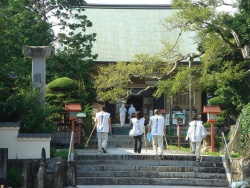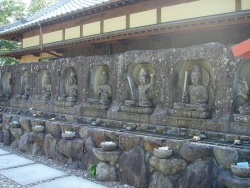Difference between revisions of "Kanjizai-ji"
| Line 1: | Line 1: | ||
| − | '''Kanjizaiji''' (観自在寺) is a [[Shingon | + | '''[[Kanjizaiji]]''' ([[観自在寺]]) is a [[Shingon Buddhist temple]] in [[Ainan-cho]] ([[愛南町]]), [[Minamiuwa District]], [[Ehime]], [[Japan]]. |
| − | Ji ([[寺]]) means [[temple]] in [[Japanese]]. [[Kanjizai]] (観自在) is the [[name]] of [[Avalokitesvara]] ([[観音]], [[Kannon]]) which is used in the [[Heart Sutra]] (般若心経, Hannya-Shingyo). | + | |
| + | It is number 40 of the 88 [[temples]] in the {{Wiki|Shikoku}} [[Pilgrimage]]. | ||
| + | |||
| + | [[Ji]] ([[寺]]) means [[temple]] in [[Japanese]]. | ||
| + | |||
| + | [[Kanjizai]] ([[観自在]]) is the [[name]] of [[Avalokitesvara]] ([[観音]], [[Kannon]]) which is used in the [[Heart Sutra]] ([[般若心経]], [[Hannya-Shingyo]]). | ||
[[File:Kanjizaiji1.jpg|thumb|250px|]] | [[File:Kanjizaiji1.jpg|thumb|250px|]] | ||
| − | :::The history of the [[temple]] is said to date to the year 807 when [[Kūkai]] visited the town and made 3 [[venerable]] [[statues]] (尊像, sonzou) in [[honor]] of {{Wiki|Emperor Heizei}}. At that time he made the [[honzon]] of [[Yakushi Nyorai]] (本尊薬師如来), | + | :::The history of the [[temple]] is said to date to the year 807 when [[Kūkai]] visited the town and made 3 [[venerable]] [[statues]] ([[尊像]], [[sonzou]]) in [[honor]] of {{Wiki|Emperor Heizei}}. |
| − | There are some events in each month and sometimes there are so many booths on the street. The small {{Wiki|festival}} is called [[O-daishi-sama]] (御大師様) and it is held once around two months to celebrate the tie with [[Kūkai]]. | + | |
| + | At that time he made the [[honzon]] of [[Yakushi Nyorai]] ([[本尊薬師如来]]), [[Wakihutsu Amida-Nyorai]] ([[脇仏阿弥陀如来]]) and [[Jūichimen Kanzenon]] ([[十一面観世音]]). | ||
| + | |||
| + | These [[statues]] were quite [[precious]] for all the [[people]] from the commonalty to the [[Emperors]]. | ||
| + | |||
| + | {{Wiki|Emperor Heizei}} and [[Emperor Saga]] visited this [[temple]] every year. That's why, the area around this [[temple]] became called [[Hirajo]] ([[平城]]) whose [[character]] means [[Heizei]] ([[平城]]). | ||
| + | |||
| + | There are some events in each month and sometimes there are so many booths on the street. | ||
| + | |||
| + | The small {{Wiki|festival}} is called [[O-daishi-sama]] ([[御大師様]]) and it is held once around two months to celebrate the tie with [[Kūkai]]. | ||
| + | |||
| + | |||
| + | :::[[Kanjizaiji]] has some special features. | ||
| + | |||
| + | This [[temple]] has one of the [[Nanyo Seven Gods of Fortune]] ([[南予七福神]], [[Nanyo-ShichiFukujin]]) in [[Houshūden-Hakkakudou]] ([[宝聚殿八角堂]]). | ||
| + | |||
| + | [[Nanyo]] ([[南予]]) means the southern part of [[Ehime]]. | ||
| + | |||
| + | The [[deity]] of this [[temple]] is called [[Benzaiten]] ([[弁財天]]). | ||
| + | She is a [[deity]] of [[treasure]] and [[arts]]. | ||
| − | + | She prevents the natural {{Wiki|disasters}} for [[people]], and brings the rich harvest in the town. And also she brings [[people]] [[good fortune]] of studying. | |
[[File:Kanjizaiji6.jpg|thumb|250px|]] | [[File:Kanjizaiji6.jpg|thumb|250px|]] | ||
| − | Kanjizaiji has also [[statues]] of the twelve {{Wiki|Zodiac}} [[signs]] (干支, Eto), and they're called Hattaihutsu-Jūnishi-Honzon (八体仏十二支本尊). The visitors [[water]] their [[own]] [[signs]]' [[statues]] and pray to it. | + | Kanjizaiji has also [[statues]] of the twelve {{Wiki|Zodiac}} [[signs]] ([[干支]], [[Eto]]), and they're called [[Hattaihutsu-Jūnishi-Honzon]] ([[八体仏十二支本尊]]). The visitors [[water]] their [[own]] [[signs]]' [[statues]] and pray to it. |
{{W}} | {{W}} | ||
[[Category:Buddhist Pilgrimages]] | [[Category:Buddhist Pilgrimages]] | ||
| + | [[Category:Japanese Buddhist Temples]] | ||
Latest revision as of 05:32, 5 February 2016
Kanjizaiji (観自在寺) is a Shingon Buddhist temple in Ainan-cho (愛南町), Minamiuwa District, Ehime, Japan.
It is number 40 of the 88 temples in the Shikoku Pilgrimage.
Ji (寺) means temple in Japanese.
Kanjizai (観自在) is the name of Avalokitesvara (観音, Kannon) which is used in the Heart Sutra (般若心経, Hannya-Shingyo).
At that time he made the honzon of Yakushi Nyorai (本尊薬師如来), Wakihutsu Amida-Nyorai (脇仏阿弥陀如来) and Jūichimen Kanzenon (十一面観世音).
These statues were quite precious for all the people from the commonalty to the Emperors.
Emperor Heizei and Emperor Saga visited this temple every year. That's why, the area around this temple became called Hirajo (平城) whose character means Heizei (平城).
There are some events in each month and sometimes there are so many booths on the street.
The small festival is called O-daishi-sama (御大師様) and it is held once around two months to celebrate the tie with Kūkai.
- Kanjizaiji has some special features.
This temple has one of the Nanyo Seven Gods of Fortune (南予七福神, Nanyo-ShichiFukujin) in Houshūden-Hakkakudou (宝聚殿八角堂).
Nanyo (南予) means the southern part of Ehime.
The deity of this temple is called Benzaiten (弁財天).
She is a deity of treasure and arts.
She prevents the natural disasters for people, and brings the rich harvest in the town. And also she brings people good fortune of studying.
Kanjizaiji has also statues of the twelve Zodiac signs (干支, Eto), and they're called Hattaihutsu-Jūnishi-Honzon (八体仏十二支本尊). The visitors water their own signs' statues and pray to it.

